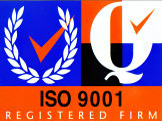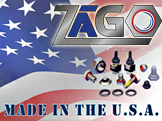ZāGO - How to Order - Standard Seal Screws

When choosing an "O"-ring there are several factors to consider in determining proper selection including: the application for which the "O"-ring is to be used; the media to be sealed; the size of the fastener to be sealed; and the temperature and pressure to which the "O" ring will be subjected. Once each of these factors has been considered and an "O" ring has been chosen, engineering calculations should either be checked manually or by using "O" ring selection software.
"O" Ring Materials
Our customers can choose from six basic materials which come in durometer ranges from 60-70 hardness depending on the chosen material. In addition to the materials listed below, other materials are available upon request.
 ETHYLENE PROPYLENE (EPDM): Our EPDM compounds are commonly used in outdoor environments and are excellent for weather & water resistant applications/appliances having excellent ozone, steam and chemical resistance.
ETHYLENE PROPYLENE (EPDM): Our EPDM compounds are commonly used in outdoor environments and are excellent for weather & water resistant applications/appliances having excellent ozone, steam and chemical resistance.
 BUNA- N (Nitrile): Our Buna-N compound is the most common seal material chosen by our customers because of its versatility and resistance to petroleum-based substances, water and alcohols.
BUNA- N (Nitrile): Our Buna-N compound is the most common seal material chosen by our customers because of its versatility and resistance to petroleum-based substances, water and alcohols.
 NEOPRENE (Chloroprene): Our neoprene compounds are commonly used in the refrigeration industry for their resistance to ammonia and freon.
NEOPRENE (Chloroprene): Our neoprene compounds are commonly used in the refrigeration industry for their resistance to ammonia and freon.
 SILICONE: Our silicone rubber has an excellent temperature range and can withstand low temperatures without becoming brittle.
SILICONE: Our silicone rubber has an excellent temperature range and can withstand low temperatures without becoming brittle.
 FLUOROSILICONE: Our fluorosilicone compounds are commonly used in the automotive and aerospace industries because of their excellent fuel, oil and solvent resistance.
FLUOROSILICONE: Our fluorosilicone compounds are commonly used in the automotive and aerospace industries because of their excellent fuel, oil and solvent resistance.
 FLUOROCARBON (VITON): Our Viton compounds are the preferred choice when seals are required for aircraft engines and automotive fuel handling because of its excellent resistance to high temperatures and harsh chemicals.
FLUOROCARBON (VITON): Our Viton compounds are the preferred choice when seals are required for aircraft engines and automotive fuel handling because of its excellent resistance to high temperatures and harsh chemicals.
Choosing Screw Material
There are generally one or more materials which will perform satisfactorily in a given environment. We provide this information as a service to our customers to assist in choosing a suitable alloy for a diverse range of applications.
ALUMINUM
The most abundant metal in the earth’s crust, it is bluish and silvery-white, very light, malleable, and ductile with high heat and electric conductivity. It is non-magnetic and 1/3 the weight of steel with good corrosion resistance against certain chemicals and acids but weak resistance against other elements.
AUSTENITIC
A crystal structure formed by heating steel (corrosion-resistant steel) chromium, and nickel to a high temperature where it forms the characteristics of 300 series stainless steel (the most popular of the stainless alloys). The highest level of corrosion resistance in the stainless family, cannot be hardened by heat treatment, and are almost always non-magnetic. Sometimes heat and friction in cold forming can cause austenitic stainless to take on slight magnetism, but the corrosion resistant properties remain the same. There are a variety of austenitic grades with huge varieties of usages.
COPPER
A ductile, malleable, reddish-brown element that is an excellent conductor of heat and electricity. It is non-magnetic with low to average strength and good corrosion resistance. Brass and silicone bronze gain their strength from the addition of other metals, such as silicon.
BRASS
The most common alloy of copper. It is approximately 2/3 copper and 1/3 zinc. It has high electrical conductivity, non-magnetic with low to average strength and good corrosion resistance. Brass and silicon bronze gain their strength from the addition of other metals, such as silicon.
MONEL
Approximately 2/3 nickel and 1/3 copper. It has good strength and excellent corrosion resistance against salt water and in high temperatures.
STEEL
A hard, strong, durable, malleable alloy of iron and carbon. It contains other elements such as manganese, chromium, nickel, molybdenum, copper, tungsten, cobalt or silicon, all depending on the desired alloy properties.
TITANIUM
A silvery gray, low-density, lightweight, highly corrosion-resistant, and high strength metal.












